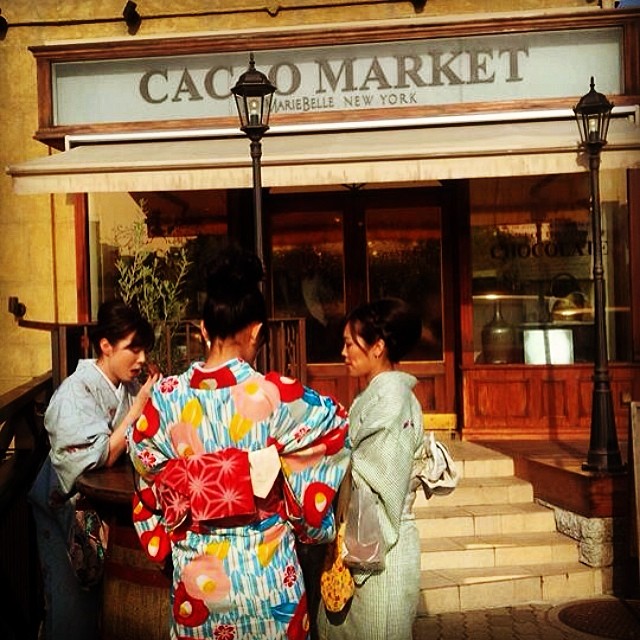Español“Do you know Honduras?” Maribel Lieberman asks me as we begin our Skype interview. She is a proud Honduran and entrepreneur, and we are talking via webcam in her store, MarieBelle Fine Treats and Chocolates. In SoHo, New York, it was once an art gallery, now refurbished with the original style of the interwar period.

She was a member of the “Empowering Latinas” panel with Eva Longoria at the Women’s World Congress in 2013, and Inc. Magazine named her one of the fastest-growing entrepreneurs in the United States in 2012. She has even received praise from US media icon Oprah Winfrey.
Her life story is one of determination and inspiration, and it reads like a Hollywood script. Her optimism is not daunted by recession, crisis, discrimination, or the bureaucratic whims of authoritarian governments.
Lieberman is a woman of the world, and her operation in SoHo is only the tip of the iceberg. She has opened four MarieBelle franchises in Japan, and is about to open others in Dubai, Kuwait, Bahrain, and possibly China.
She patiently explains that Japan has always been her best source of clients: “They love the detail, the exterior, the design,” and she tells me — almost as if giving advice — their trends are almost always copied in Korea and China.
Honduran Roots
“I was an entrepreneur from a young age. I was born in a small town of no more than 500 people. There was school until sixth grade, and after that you had to travel to another city to continue studying.”
“I was always a visionary. I always dreamt about traveling far away, since I was eight years old.”
It was at this age that she started selling butter candies at school. When she turned nine, she was able to buy her first pair of shoes.
“When we moved to the city, I worked during vacation, wrapping Christmas gifts.”
There are very few Latinos who actually study English to get ahead. That was one of the differences that separated me from the rest. I always established goals.
She studied briefly to be a bilingual secretary, but got frustrated as she struggled with the typing course. This prompted her to emigrate to Washington, DC, to work as a nanny: “I was scared that I wouldn’t become anything; this was why I left. I was 17, alone, and eventually I thought I would return to Honduras to live forever.”
As soon as she got to the United States, she began to learn English: “There are very few Latinos who actually study English to get ahead. That was one of the differences that seperated me from the rest. I always established goals.”
But after living in DC for some time, she returned to Honduras to recharge.

Her next stop was New Orleans, where she lived for six years, working for a Japanese cosmetics company: “I worked during the day, and at night went to class to earn my high-school diploma.”
“I started as a sales person and was promoted to sales representative. That’s when I decided to move to New York, where the company’s US headquarters were located.”
When she arrived in New York, she enrolled in fashion-design courses. She soon graduated and began working as an illustrator.
“I loved fashion,” she says, “but not the fashion world. It was very fake.”
In the midst of all this, she got married and, as if by cliche, began to cook.
“I began to explore all the cultures of New York. I was intrigued by all of them. I started to buy ingredients from different stores, like the Indian or Japanese market. I explored cookbooks that were based on these ingredients, and I started to make fusion meals.”
She experienced five years of great success with her venture, a catering company called Maribel’s Gourmet Cuisine. She also started to rub shoulders with socialites such as the Christian Dior leadership and Bill Clinton.
I realized that chocolate and cocoa are from my country and from America. I was excited … destined to bring credit to my country.
But her first business selling chocolates came as a fluke: “I really wanted to open a gourmet market to give a face to my catering business. I wanted to represent ingredients from every country. That was my vision, but it wasn’t in the budget.”
“So, I chose just one ingredient: chocolate.” When she decided to focus exclusively on chocolates, she began to investigate the history of the ingredient — a history that, until that point, she knew very little about.

She smiles when she tells the story of her epiphany: “I realized that chocolate and cocoa are from my country and from America. I was excited; I was destined to bring credit to my country, rather than credit going to places like Belgium and France.”
From 2002 — when Lieberman first opened the SoHo location — until 2004, she imported African cocoa from Europe. “But then I started to become aware of the slavery associated with the cocoa industry on that continent, and I decided to begin importing Latin-American cocoa.”
“If someone is destined to do something, there is a reason for it. One has to learn to see those reasons. They are there. I do this to give back to my country for what it gave to me, to give Honduras a name in the world.”
A Latina Entrepreneur in the United States
When we start to talk business, her speech slows to a more calculated pace. I ask her about the differences between starting a business in Honduras and in the United States, and she looks at the ground for her answer: “It’s more difficult in Honduras.”
People in New York are more open. They are not guided by trends or tendencies like in Honduras. In New York, if the product is good, people will buy it
However, as we begin to discuss the differences between the two countries, she chooses to speak from the point of view of the market: “People in New York are more open. They are not guided by trends or tendencies like in Honduras. In New York, if the product is good, people will buy it; they aren’t conservative in this sense.”
As for business, she believes there is greater access for entrepreneurs in the United States: “There isn’t so much bureaucracy.”
What does it take to undertake this type of initiative? “It takes hard work — a willingness to work and to persevere. You also have to believe in yourself. That’s the key.”
Her definition is a carbon copy of her life story: “You have to catch up with the rest of the world; you have to learn English and interact with other people. You should compare your products with the others that are sold around the world, not just in your city. This is how you get to the top.”
If you focus on discrimination, you will get lost. If you are confident in yourself, then the person who ends up the loser is the one doing the discriminating.
Without prompt, she tells me about discrimination in the United States. “There’s no doubt,” she says, but many Latinos living here are overloaded with that complex. “If you focus on discrimination, you will get lost. If you are confident in yourself, then the person who ends up the loser is the one doing the discriminating.”
In her final words, she speaks of a prosperous future for Latin America: “We Latinos work very hard.” And she believes this is one of the keys to being a successful entrepreneur. “The others are: perseverance, vision, opportunity, and passion.”
“And maybe a little bit of luck?” I ask.
“You make your own luck,” she replies.
 Versión Español
Versión Español












